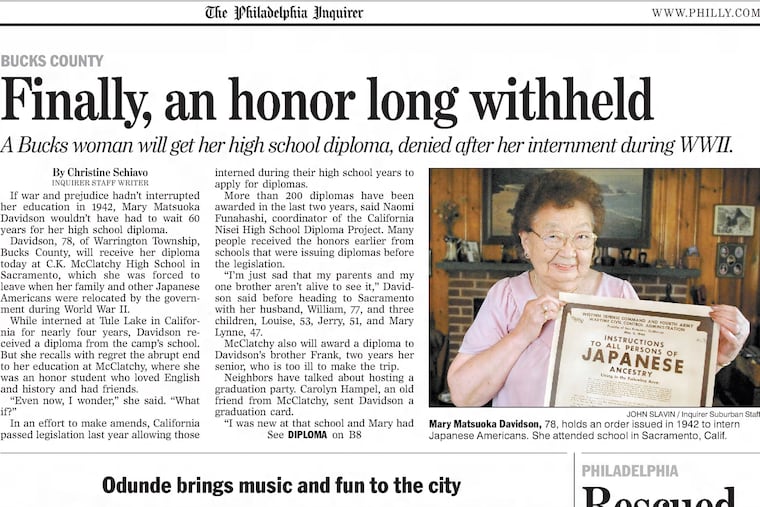From the archives: Bucks woman gets diploma after 60 years
Mary Matsuoka Davidson waited 60 years for her diploma.

This article originally appeared in The Inquirer on June 13, 2005
If war and prejudice hadn’t interrupted her education in 1942, Mary Matsuoka Davidson wouldn’t have had to wait 60 years for her high school diploma.
Davidson, 78, of Warrington Township, Bucks County, will receive her diploma today at C.K. McClatchy High School in Sacramento, which she was forced to leave when her family and other Japanese Americans were relocated by the government during World War II.
While interned at Tule Lake in California for nearly four years, Davidson received a diploma from the camp's school. But she recalls with regret the abrupt end to her education at McClatchy, where she was an honor student who loved English and history and had friends.
“Even now, I wonder,” she said. “What if?”
In an effort to make amends, California passed legislation last year allowing those interned during their high school years to apply for diplomas.
More than 200 diplomas have been awarded in the last two years, said Naomi Funahashi, coordinator of the California Nisei High School Diploma Project. Many people received the honors earlier from schools that were issuing diplomas before the legislation.
"I'm just sad that my parents and my one brother aren't alive to see it," Davidson said before heading to Sacramento with her husband, William, 77, and three children, Louise, 53, Jerry, 51, and Mary Lynne, 47.
McClatchy also will award a diploma to Davidson's brother Frank, two years her senior, who is too ill to make the trip.
Prior to the internment, Davidson said, her family’s movements were restricted to the house and fields of their rented farm. Davidson stopped going to school. The family relied on neighbors to fetch things at the store. Then executive order 9066 was posted in February 1942, and one of Davidson’s brothers came home with the news of relocation.
"We had to leave everything," Davidson said. "The only things you could take were things you could carry in your hands. "
They were bused to a temporary camp until the Tule Lake relocation center, now a California state historic site, was ready. Their lives, once unrestricted amid the cornfields and apple orchards that stretched for acres, was confined to a few barracks in a barren camp. The family of six was expected to sleep on Army cots in a small room with a coal stove. Davidson’s brother Frank moved in with a smaller family to give his own more space.
Davidson remembers her life at Tule Lake episodically, climbing the stony hill behind the barracks, eating lamb curry three times a week, showering in stalls that offered no privacy.
She grows melancholy about her parents, Japanese immigrants who sacrificed to farm the land and feed their family. Before Pearl Harbor, their burden had eased as two of their children finished school and started working.
“I felt bad for my parents,” Davidson said. “All their lives, they worked hard and had no pleasures.”
Her father died in Japan, where most of the family had gone after the camp closed in 1946. They found work in the rebuilding effort. There, Davidson met her husband, who is originally from Philadelphia.
The Davidsons settled in Bucks County. William worked for Bell Telephone. Davidson’s mother and brothers eventually resettled in California.
When she addresses the Class of 2005 today at McClatchy, Davidson will share her story with young people three generations removed from World War II.
"If it was up to me, I would say, ‘Put the diploma in the mail,’ " she said. “I’m doing this for my parents. And because it was history.”